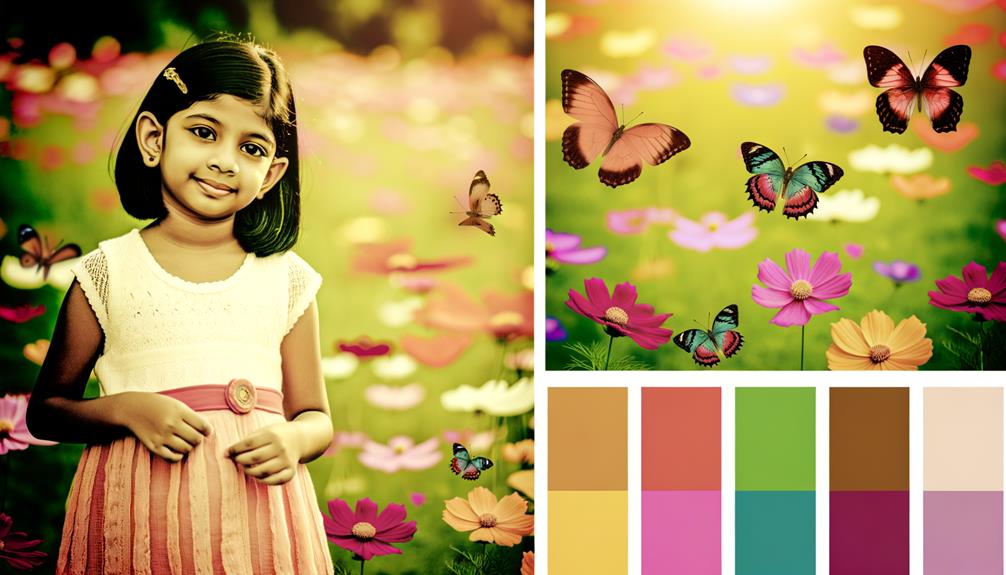Meaning of the Name Lottie
The name Lottie, a diminutive of Charlotte, originates from French and Germanic roots. It stems from the Old German name Karl, meaning 'free man.' Historically, it has been borne by notable figures like missionary Lottie Moon and performer Lottie Collins, symbolizing tenacity and humanitarian effort.
Its popularity peaked in the late 19th and early 20th centuries, with a resurgence in modern times. Variations such as Lotte, Lotta, and Lotti reflect regional adaptations.
In different languages, it conveys meanings from strength to grace. To understand its full cultural resonance and evolving trends, continue exploring.

Key Takeaways
- Lottie is a diminutive form of the name Charlotte.
- The name originates from Old German, meaning 'free man.'
- Popular in French and Germanic traditions, Lottie embodies charm and warmth.
- Historically linked to resilience and humanitarian efforts through figures like Lottie Moon and Lottie Collins.
- Modern trends show a resurgence in its popularity among new parents.
Origins of the Name Lottie
The name Lottie originates as a diminutive form of the name Charlotte, which itself has roots in the French and Germanic traditions. Derived from the Old German name Karl, meaning 'free man,' Charlotte became widely adopted in French-speaking regions and eventually spread globally.
As a diminutive, Lottie retains the core elements of its parent name while adding a layer of familiarity and affection. The linguistic evolution of names like Lottie underscores cultural practices in name formation, where diminutives often serve to convey endearment and intimacy.
This naming convention reflects broader societal norms and familial structures, illustrating the interplay between language and social identity. Understanding these origins provides valuable insights into the cultural and linguistic development of personal names.
Historical Significance
Emerging in various historical contexts, the name Lottie has been borne by notable figures whose lives and accomplishments have contributed to its enduring legacy.
One such figure is Lottie Moon, a pioneering Southern Baptist missionary in China during the late 19th century. Her relentless dedication and influence in promoting education and healthcare left an indelible mark on both her community and her contemporaries.
Similarly, Lottie Collins, a celebrated music hall performer of the Victorian era, popularized the song 'Ta-ra-ra Boom-de-ay,' symbolizing cultural vibrancy.
These individuals exemplify the multifaceted impact of the name Lottie, demonstrating its association with tenacity, cultural enrichment, and humanitarian efforts.
Their legacies offer a profound understanding of the name's historical resonance.
Etymology and Linguistic Roots
Rooted in the diminutive form of the name Charlotte, 'Lottie' traces its linguistic origins to the Old German name Karl, meaning 'free man'.
This etymology reveals the name's deep historical and cultural significance. The shift from Karl to Charlotte, and subsequently to Lottie, illustrates a meaningful evolution in linguistic adaptation.
To further understand the name 'Lottie', consider the following points:
- Diminutive Form: Lottie is a diminutive of Charlotte, used affectionately.
- Old German Roots: The name originates from Karl, signifying 'free man'.
- Adaptation: Over centuries, the name evolved from Karl to Charlotte to Lottie.
- Cultural Persistence: Lottie has maintained its charm across different cultures.
- Linguistic Evolution: Reflects broader changes in language and naming conventions.
This detailed examination provides insight into the name's etymological journey.
Popularity Over Time
The name Lottie has experienced fluctuating levels of popularity, influenced by historical and cultural trends. While its prominence peaked in the late 19th and early 20th centuries, its usage has seen a resurgence in modern times, particularly in English-speaking countries.
This section will examine the historical name trends and analyze its current standing in contemporary society.
Historical Name Trends
Tracking the name Lottie through historical records reveals fluctuating trends in its popularity, influenced by cultural, social, and literary factors across different periods. In the late 19th and early 20th centuries, Lottie saw a peak, driven largely by the Victorian era's fondness for diminutive forms of traditional names.
However, its popularity waned mid-century as naming conventions shifted toward modern and unique names. Literary works have intermittently revived interest in Lottie, further affecting its popularity trajectory.
- Late 1800s: Popular due to Victorian naming trends.
- Early 1900s: Continued popularity, especially in English-speaking countries.
- Mid-1900s: Decline as modern names rose in favor.
- Literary Influence: Periodic revivals linked to novels and films.
- Historical Context: Reflects broader shifts in naming conventions.
Modern-Day Usage
Shifting from its historical fluctuations, the name Lottie has seen a resurgence in modern-day usage, evidenced by its reappearance on contemporary baby name charts and its growing appeal among new parents. This revival can be attributed to a broader trend of vintage names making a comeback, as well as the name's endearing simplicity and nostalgic charm.
Data from various national statistics offices indicate a steady climb in Lottie's ranking, particularly in countries like the United Kingdom and Australia. Additionally, celebrity influence and media exposure have contributed to its renewed popularity. The name Lottie, once perceived as old-fashioned, now resonates with a new generation of parents seeking a classic yet fresh choice for their children's names.
Cultural References
In literature and popular media, the name Lottie often evokes a sense of nostalgia and timeless charm, frequently associated with characters embodying innocence, resilience, and warmth. This name, a diminutive of Charlotte, often appears in narratives that highlight traditional values and emotional depth.
Lottie's presence in stories and films frequently underscores themes of familial bonds, personal growth, and moral integrity. Consider the following cultural references:
- Literature: Lottie is featured in numerous classic and contemporary novels, often as a beloved supporting character.
- Films: Characters named Lottie often project endearing, heartfelt qualities in cinematic narratives.
- Television: TV series regularly depict Lottie as a character with a steadfast moral compass.
- Theater: Plays frequently utilize the name Lottie for characters that symbolize hope and perseverance.
- Animation: Animated characters named Lottie often embody youthful exuberance and kindness.
Famous People Named Lottie
The name Lottie has been borne by a number of notable individuals, spanning various domains and time periods. Historical figures such as Charlotte 'Lottie' Moon, a Southern Baptist missionary to China, illustrate the name's longstanding significance.
Additionally, contemporary celebrities and fictional characters named Lottie contribute to its enduring popularity and cultural impact.
Historical Figures Named Lottie
Prominent historical figures named Lottie include Lottie Moon, a pioneering Southern Baptist missionary known for her extensive work in China. Born in 1840, Moon dedicated nearly 40 years of her life to missionary efforts, profoundly influencing the spread of Christianity in China and advocating for women's roles in the church. Her legacy is profound, inspiring numerous initiatives and memorials.
Other notable figures named Lottie include:
- Lottie Dod: Five-time Wimbledon tennis champion, also excelled in archery and golf.
- Lottie Collins: English singer and dancer famous for popularizing the song 'Ta-ra-ra Boom-de-ay.'
- Lottie Pickford: Silent film actress and sister of Mary Pickford, a co-founder of United Artists.
- Lottie Blair Parker: American playwright and actress, known for her play 'Way Down East.'
Celebrities Named Lottie
While historical figures named Lottie have left indelible marks on their respective fields, contemporary celebrities continue to uphold the name's legacy with significant contributions across various industries.
Lottie Moss, a prominent British fashion model, has made a considerable impact in the fashion world, appearing in high-profile magazines and campaigns.
Additionally, Lottie Tomlinson, a makeup artist and social media influencer, has garnered a substantial following for her innovative beauty tutorials and collaborations with renowned brands.
These modern Lotties exemplify versatility and influence, demonstrating that the name remains synonymous with talent and success. Their achievements highlight the enduring appeal and relevance of the name Lottie, reinforcing its presence in contemporary culture and inspiring future generations.
Fictional Characters Named Lottie
Numerous fictional characters named Lottie have been crafted across literature, film, and television, often embodying distinct and memorable traits that resonate with audiences. These characters, each unique in their narrative roles, contribute to the cultural fabric by providing varied representations of the name Lottie. Their presence in diverse genres highlights the versatility and enduring appeal of the name.
- Lottie Person: The main character in the graphic novel series 'Snotgirl' by Bryan Lee O'Malley, a fashion blogger grappling with personal insecurities.
- Lottie Pumpkin: Protagonist in the 'Undercover Princess' series by Connie Glynn, a commoner mistaken for royalty.
- Lottie: A character in the animated film 'The Princess and the Frog,' Tiana's supportive, wealthy best friend.
- Lottie: From the novel 'The Enchanted April' by Elizabeth von Arnim, a woman seeking escape and transformation.
- Lottie: A supporting character in the TV series 'Outlander,' known for her resilience and compassion.
Variations and Nicknames
The name Lottie has several variations and nicknames that differ based on linguistic and cultural contexts. These variations often reflect regional adaptations and phonetic preferences. For instance, in English-speaking countries, Lottie is commonly a diminutive of Charlotte. Meanwhile, in other cultures, alternative forms and affectionate nicknames evolve to adapt to local languages.
| Variation | Origin/Usage |
|---|---|
| Lotte | German, Dutch |
| Lotta | Swedish, Finnish |
| Lotti | Italian |
| Charlotta | Spanish, Italian |
Such variations enrich the name's versatility and global appeal. Understanding these adaptations provides deeper insights into how names are influenced by linguistic practices and cultural nuances. This analysis underscores the dynamic nature of names and their capacity to transcend geographical boundaries.
Meaning in Different Languages
Often rooted in historical and cultural contexts, the meaning of the name Lottie varies greatly across different languages. Derived from the name Charlotte, Lottie carries nuances that reflect diverse linguistic traditions and societal values.
Analyzing its significance in various tongues reveals both commonalities and unique interpretations.
- English: Often seen as a diminutive of Charlotte, meaning 'free man' or 'petite.'
- French: Similarly, a diminutive of Charlotte, with royal connotations from Queen Charlotte.
- German: Reflects strength and femininity, akin to its origin, Karl, meaning 'man' or 'husband.'
- Scandinavian: Maintains the diminutive form but emphasizes grace and nobility.
- Dutch: Used affectionately, it maintains the original meaning while adding a sense of endearment.
Understanding these meanings enriches our appreciation of Lottie's cultural depth.
Modern Usage and Trends
In contemporary society, the name Lottie enjoys a resurgence in popularity, reflecting broader trends in naming conventions and cultural preferences. This revival can be attributed to a growing inclination towards vintage and classic names, which evoke a sense of nostalgia and timelessness.
The appeal of Lottie lies in its simplicity and charm, making it a favored choice among parents seeking names that are both distinctive and rooted in tradition. Moreover, the rise of celebrity culture and media influence has contributed to its modern appeal, as public figures often choose retro names for their children.
The name's adaptability across different cultures and languages enhances its global appeal, cementing its status as a versatile and enduring choice.
Conclusion
In the tapestry of linguistic heritage, the name Lottie emerges as a gem, intertwining historical significance and etymological depth. Its journey through time, marked by fluctuating popularity and adorned with cultural references, paints a vivid portrait of its enduring charm.
The name's variations and linguistic nuances further enrich its appeal, while its modern usage reflects a blend of tradition and contemporary trends. Lottie, therefore, stands as a beacon of timeless elegance in the ever-evolving landscape of names.






